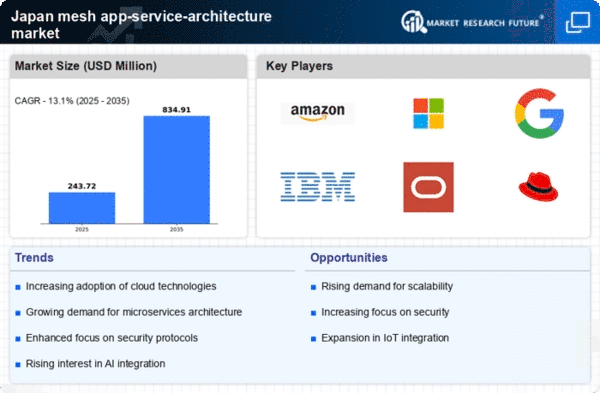Rising Demand for Scalability
The increasing need for scalable solutions in the mesh app-service-architecture market is driven by the rapid growth of digital services in Japan. Businesses are seeking architectures that can efficiently handle fluctuating workloads and user demands. This trend is particularly evident in sectors such as e-commerce and online services, where traffic can vary significantly. As organizations aim to enhance their operational efficiency, The mesh app-service-architecture market is expected to witness a surge in adoption. Reports indicate a potential market growth at a CAGR of approximately 15% over the next five years, reflecting the urgency for scalable solutions. Companies are investing in technologies that allow for seamless scaling, thereby enhancing their competitive edge in a dynamic market environment.
Adoption of Cloud-Native Solutions
The transition towards cloud-native solutions is a significant driver in the mesh app-service-architecture market. Japanese enterprises are increasingly migrating their applications to cloud environments to leverage the benefits of flexibility, cost-effectiveness, and enhanced performance. This shift is fostering the adoption of mesh architectures that are inherently designed to operate in cloud environments. As organizations seek to optimize their IT infrastructure, the mesh app-service-architecture market is expected to experience robust growth. Current estimates suggest that the market could expand by approximately 30% by 2027, driven by the increasing reliance on cloud technologies. This trend indicates a broader movement towards modernizing IT frameworks to support agile and scalable business operations.
Growing Emphasis on User Experience
In the competitive landscape of Japan's digital economy, enhancing user experience has become a pivotal focus for businesses. The mesh app-service-architecture market is responding to this demand by providing solutions that enable faster and more reliable service delivery. Companies are increasingly adopting architectures that allow for rapid deployment of applications, ensuring that user needs are met promptly. This shift is particularly relevant in sectors such as finance and telecommunications, where customer satisfaction is paramount. As organizations strive to improve their service offerings, the mesh app-service-architecture market is projected to grow significantly, with estimates indicating a potential increase in market value by 25% over the next few years. This emphasis on user experience is likely to drive further innovation within the market.
Increased Focus on Interoperability
Interoperability has emerged as a crucial driver in the mesh app-service-architecture market, particularly in Japan's diverse technological landscape. Organizations are increasingly recognizing the importance of integrating various applications and services to streamline operations. This need for seamless communication between different systems is pushing businesses to adopt mesh architectures that facilitate interoperability. The Japanese government has also been promoting initiatives aimed at enhancing digital integration across sectors, which further supports this trend. As a result, the mesh app-service-architecture market is likely to expand, with projections suggesting a potential market size increase of 20% by 2026. This focus on interoperability not only enhances operational efficiency but also fosters innovation by enabling the integration of new technologies.
Regulatory Compliance and Data Governance
In Japan, the mesh app-service-architecture market is increasingly influenced by regulatory compliance and data governance requirements. Organizations are under pressure to adhere to stringent data protection laws and industry regulations, which necessitate the implementation of robust architectural frameworks. The need for compliance is driving businesses to adopt mesh architectures that offer enhanced security and data management capabilities. As companies navigate the complexities of regulatory landscapes, the mesh app-service-architecture market is likely to see a growth trajectory, with projections indicating a potential market increase of 15% by 2026. This focus on compliance not only mitigates risks but also enhances trust among consumers, thereby fostering a more secure digital environment.
















